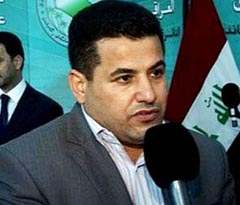An Iraqi parliamentarian disclosed that the country’s al-Iraqiya alliance, headed by former Iraqi 
"The organization (the terrorist cult) has strong links with a number of al-Iraqiya leaders and is directly supported by these (political) leaders," Member of National Iraqi Alliance at the Iraqi parliament Qassem al-A’raji told FNA on Wednesday.
He also said the MKO (also known as MEK, NCR and PMOI) most likely has tight ties with fugitive Iraqi Vice-President Tareq al-Hashemi.
As regards the recent evacuation of MKO’s main training camp in Iraq, the Iraqi lawmaker called it "a victory for the Iraqi nation and government’s will and determination".
He added that the greater victory would be the trial of all criminals for their crimes against Iraqi people.
Earlier this year, the Iraqi government set a new deadline for the MKO to evacuate its members from Camp Ashraf by October this year.
The MKO cannot find a shelter outside Iraq as it is blacklisted by much of the international community, including the United States.
Earlier in July, Iraqi Prime Minister Nuri al-Maliki and the UN Secretary-General’s Representative in Iraq Martin Kobler agreed to put an end to the dossier of MKO’s presence in Iraq in accordance with the deadlines announced last year.
The MKO is blacklisted by much of the international community, including the United States.
Before an overture by the EU, the MKO was on the European Union’s list of terrorist organizations subject to an EU-wide assets freeze. Yet, the MKO puppet leader, Maryam Rajavi, who has residency in France, regularly visited Brussels and despite the ban enjoyed full freedom in Europe.
The MKO is behind a slew of assassinations and bombings inside Iran, a number of EU parliamentarians said in a recent letter in which they slammed a British court decision to remove the MKO from the British terror list. The EU officials also added that the group has no public support within Iran because of their role in helping Saddam Hussein in the Iraqi imposed war on Iran (1980-1988).
Many of the MKO members abandoned the terrorist organization while most of those still remaining in the camp are said to be willing to quit but are under pressure and torture not to do so.
The group, founded in the 1960s, blended elements of Islamism and Stalinism and participated in the overthrow of the US-backed Shah of Iran in 1979. Ahead of the revolution, the MKO conducted attacks and assassinations against both Iranian and Western targets.
The group started assassination of the citizens and officials after the revolution in a bid to take control of the newly established Islamic Republic. It killed several of Iran’s new leaders in the early years after the revolution, including the then President, Mohammad Ali Rajayee, Prime Minister, Mohammad Javad Bahonar and the Judiciary Chief, Mohammad Hossein Beheshti who were killed in bomb attacks by MKO members in 1981.
The group fled to Iraq in 1986, where it was protected by Saddam Hussein and where it helped the Iraqi dictator suppress Shiite and Kurd uprisings in the country.
The terrorist group joined Saddam’s army during the Iraqi imposed war on Iran (1980-1988) and helped Saddam and killed thousands of Iranian civilians and soldiers during the US-backed Iraqi imposed war on Iran.



